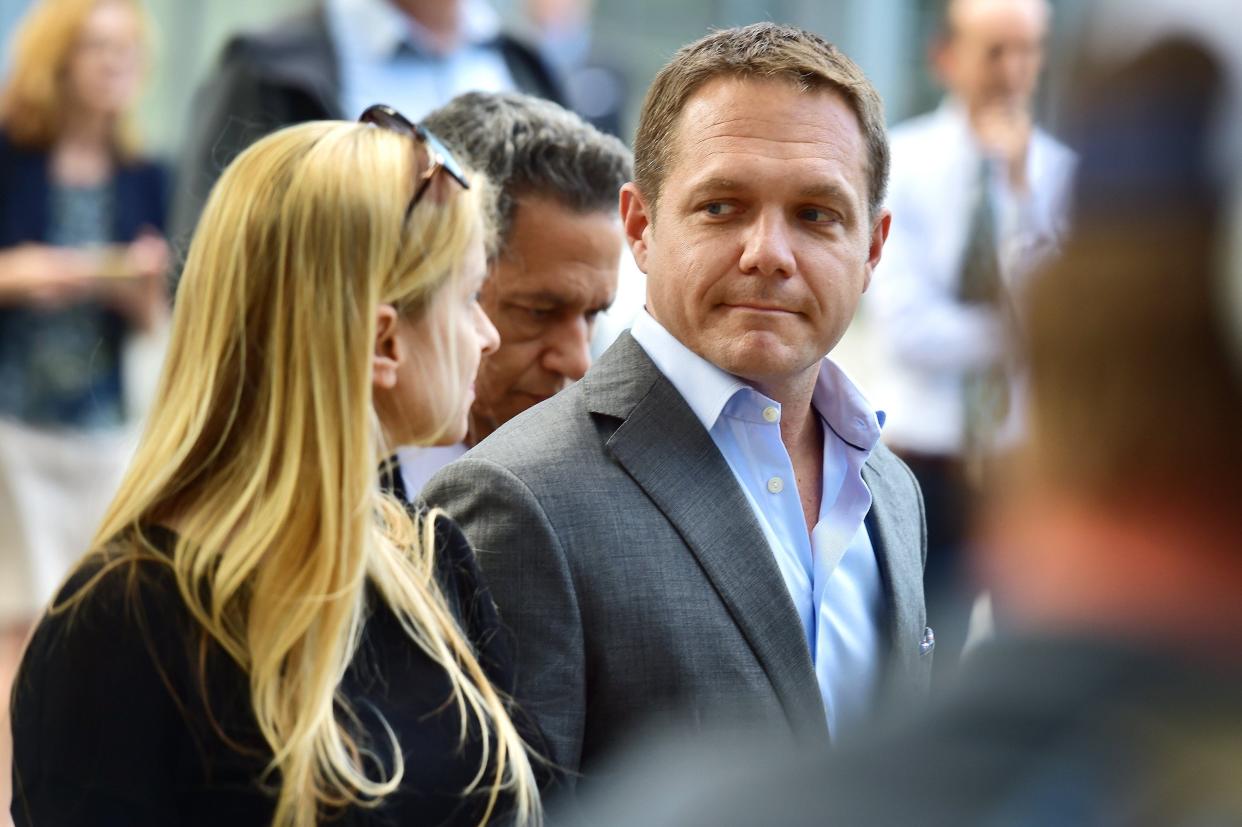Nate Monroe: Zahn told confidant 'the mayor' supported $40 million payout in JEA sale

- Oops!Something went wrong.Please try again later.
COMMENTARY | During a private phone conversation in June 2019, former JEA CEO Aaron Zahn told a consultant "the mayor" was "supportive" of him receiving $40 million if he could successfully privatize the city-owned utility, according to that consultant's testimony in federal court Wednesday.
Stephen Amdur, a New York mergers and acquisitions attorney who had been hired to help Zahn and his executive team sell the agency to a private power company, told federal prosecutors he specifically recalled Zahn telling him he had the mayor's sign off on that kind of large payout. "That's my recollection," he said.
"That never happened," said former Jacksonville Mayor Lenny Curry, who was in office during Zahn's tenure and the privatization effort, in a brief phone call Wednesday evening.
Amdur told prosecutors that Zahn also mentioned that members of JEA's executive team would receive $10 million payouts. Asked what he said in response, Amdur said, "I think my exact words were, 'OK'."
That testimony is a key piece of evidence for federal prosecutors, who accused Zahn and Ryan Wannemacher, JEA's former chief financial officer, of concocting a secret plan to skim millions of dollars in personal payouts off the top of any JEA sale proceeds. Their trial on conspiracy and wire fraud charges is scheduled to begin Feb. 20.
The phone conversation between Amdur and Zahn — who are former college roommates from Yale — took place in June 2019, according to testimony, the month before Zahn and his executive team asked the utility's board of directors to allow them to put JEA up for sale — a high-stakes, high-profile and controversial effort that imploded in December of that year without a sale ever getting finalized. On that same day, they also asked the board to sign off on what was presented as a long-term incentive program for JEA employees. Although the presentation materials provided to the board that day described it as a modest incentive program slated to cost just a few million dollars, prosecutors allege Zahn and Wannemacher were hiding its astronomically lucrative potential.
Federal prosecutors view the privatization effort and the payout scheme as linked: Under the plan Zahn and Wannemacher allegedly duped the board of directors into green-lighting, creating a multi-billion-dollar windfall for City Hall was the only way the executives could stand to make tens of millions of dollars. On its face, Amdur's testimony that Zahn was anticipating a multi-million-dollar payday gives some weight to the government's narrative.
Prosecutors have never accused Curry of wrongdoing.
Curry was a key ally for Zahn throughout the controversial privatization effort, but his administration has for years denied it knew anything about the potential payout scheme that forms the heart of the federal government's case against Zahn. Amdur's testimony is the first evidence that's ever surfaced purporting to show such a connection.
Defense attorneys did not get to scrutinize Amdur's story Wednesday. His testimony was part of a pre-trial hearing over a complicated dispute over whether prosecutors violated Zahn and Wannemacher's constitutional rights during the criminal investigation. U.S. District Judge Brian Davis has already determined their rights were not violated, but he has agreed to hold pre-trial hearings designed to ensure that the witnesses the government intends to call at trial haven't been improperly exposed to prior testimony from Zahn and Wannemacher that prosecutors are barred from using.
The hearings, which the defense requested, have the effect of presenting a one-sided account of the case because defense attorneys are limited to asking the witnesses about their potential exposure to those past statements.
Amdur's testimony also echoed a theme prosecutors plan to feature prominently in the trial: Although Zahn and Wannemacher signed on an army of consultants and attorneys to support their push to privatize JEA, those experts were uninvolved or sidelined.
Ultimately, the government has said, what the executives wanted, rather than what was legal or right, guided JEA's decision-making. And there were two things the executives wanted: to sell JEA to a private power company, and to make a lot of money.
Secrecy was key to this alleged scheme. Publicly, for example, JEA had hired McKinsey and Co., a prolific consulting firm, to help it become the leading municipal utility in the United States, but that work was, in the end, a mirage. Anton Derkach, a senior partner at McKinsey, said he got a phone call from Zahn in June of 2019 — after his firm had worked with JEA on a plan for the future for months — that indicated the utility was making an abrupt and surprising "pivot." On the call, Zahn told Derkach that JEA would be exploring privatization, Derkach testified, rendering the work McKinsey had done "irrelevant."
Others who had worked with JEA on specialized, technical issues were apparently left out of the loop as well.
An attorney with Nixon Peabody, a New York law firm that had been JEA's bond and disclosure counsel for years, testified Wednesday that she didn't receive an agenda packet before the consequential July 2019 board meeting during which the utility announced it was exploring privatization. She had to watch the meeting to find that out like any member of the general public.
Nate Monroe is a metro columnist whose work regularly appears every Thursday and Sunday. Follow him on Twitter @NateMonroeTU.
This article originally appeared on Florida Times-Union: Nate Monroe: Zahn told confidant 'the mayor' supported $40 million payout in JEA sale

